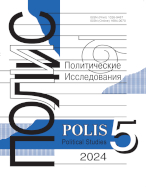Restrict to the corruption:
find new peoples or change incentives
Busygina I.M.,
Dr. Sci. (Pol. Sci.), Director of the Center for Comparative Governance Studies, Professor, Department of Applied Politics, National Research University Higher School of Economics in Saint Petersburg, moriel@mail.ru
elibrary_id: 250043 | ORCID: 0000-0001-9866-9738 | RESEARCHER_ID: R-6747-2017
Filippov M.G.,
PhD, Professor, Department of Political Science, State University of New York in Binghamton, filippov@binghamton.edu
ORCID: 0000-0001-8551-6724 |Busygina I.M., Filippov M.G. Restrict to the corruption: find new peoples or change incentives – Polis. Political Studies. 2013. No. 1
The authors argue that in the short-term the best results in fighting corruption in Russia one could obtain affecting incentives of the politicians and making this fight beneficial for them. The level of corruption in a state is a function of various variables, however under the same long-term structural, socio-economic and cultural factors different equilibria may appear. Thus, the norm corresponding to mutual expectations of the actors could be either “high-corruption” or “low-corruption” strategies. The main theoretical and practical question for Russia is how to turn from “bad” high-corruption equilibrium to “good” low-corruption one.
See also:
Korgunyuk Yu.G.,
Electoral Corruption. Medical Record. – Polis. Political Studies. 2015. No2
Turovsky R.F.,
Russia’s Local Self-Government: the Agent of the Government in the Trap of Insuffi cient Funding and Civil Passivity. – Polis. Political Studies. 2015. No2
Barsukova S.Yu., Denisova-Schmidt E.V.,
Political “Investments” by Businesses in Russia, or Why Does Business Finance Election Campaigns?. – Polis. Political Studies. 2020. No3
Lazarev Ye.A.,
Political corruption: investigating the nature of post-soviet transformations. – Polis. Political Studies. 2010. No2
Meleshkina E.Yu.,
The “Funnel of Causality” in Electoral Studies. – Polis. Political Studies. 2002. No5





.jpg)






 print
print
.jpg)
.jpg)